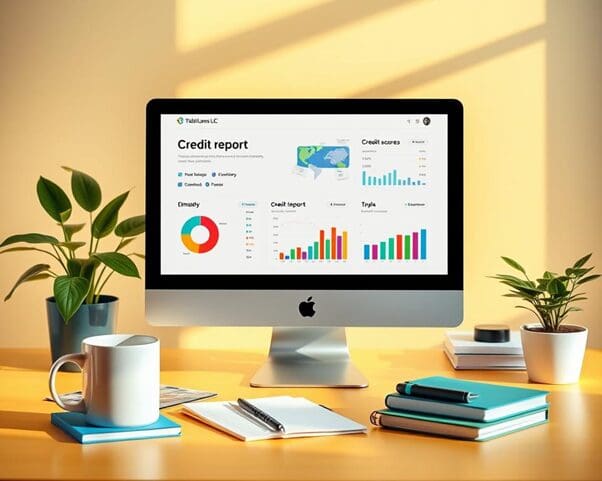Ever thought about how often you should check your credit history? It’s more than you might think.
Your credit report shows your credit history, including personal info and payment records. It’s kept by Equifax, Experian, and TransUnion. You can get one free report from each of them every 12 months. This is thanks to the Fair Credit Reporting Act.
Why is this important? Checking your free credit report helps you keep an eye on your finances. It also protects you from identity theft and mistakes that could hurt your credit. Equifax, Experian, and TransUnion give you extra free reports in certain situations. This helps you stay on top of your financial health.

Key Takeaways
- You are entitled to one free credit report annually from Equifax, Experian, and TransUnion under federal law.
- During specific periods, the bureaus offer additional free reports, such as weekly reports till April 2022.
- Monitoring your credit report helps protect against identity theft and maintain accurate financial records.
- Signing up for services like Equifax can provide even more frequent access to your Equifax report.
- Requesting your credit report involves a soft credit check, which does not affect your credit score.
Understanding Your Credit Report
Checking your credit score is key to managing your finances well. Knowing what a credit report is and why it matters is crucial.
What is a Credit Report?
A credit report details your credit history. It lists your personal info and how you handle credit. The three main credit bureaus, Equifax, Experian, and TransUnion, create these reports. They include public records and credit inquiries, giving a full picture of your credit habits.
Why Your Credit Report Matters
Your credit report is vital for your financial health. Lenders check it when you apply for credit or loans. Bad marks, like bankruptcies, can hurt your score for up to ten years.
Good credit means better loan terms and lower interest rates. Bad credit can lead to higher rates and fewer credit options. Regular checks can spot errors and protect against identity theft.
Common Terms Found in Credit Reports
Knowing credit terms helps you understand your report better. Key terms include:
- Account Balance: The amount you owe on a credit account.
- Credit Limit: The maximum credit a lender offers you.
- Negative Marks: Records of late payments or delinquent loans, lasting up to seven years.
- Credit Inquiries: Requests to see your report. Hard inquiries can lower your score, but soft inquiries don’t.
Regularly reviewing your report keeps your credit history accurate. It helps improve your credit and guards against identity theft.
How Do I Get a Credit Report?
Getting your credit report is easy. There are several ways to get it without any trouble. Let’s go over these methods so you can get your report easily.
Using AnnualCreditReport.com
The best way to get a credit report is through AnnualCreditReport.com. It’s the only site the U.S. government lets you use for free reports from Equifax, Experian, and TransUnion. You can get one free report from each agency every 12 months. Now, you can check your report from each bureau once a week for free.
Requesting by Phone or Mail
You can also get your report by phone or mail. Call 1-877-322-8228 to ask for your reports. Or, fill out the Annual Credit Report Request Form and mail it to Atlanta, GA. No matter how you request, you’ll get your reports in about 15 days. You only need to make one request to get all three reports.
Security Questions and Verification
When you ask for your report, you’ll need to answer some security questions. These questions might ask about your past addresses, loans, or credit card limits. You might need more personal info to prove who you are.
Make sure you have your Social Security Number, birthdate, and past addresses ready. This will help make the verification process easier.
If you’ve been denied credit, a job, or insurance, you can get another free report. The Fair Credit Reporting Act (FCRA) protects your right to get this important info.
Key Tips for Reviewing Your Free Credit Report
When you get your free credit report, it’s key to check it carefully. This helps keep your finances in good shape. Here’s how to do it:
What to Look for in Your Report
Start by looking at these important parts:
- Accounts you didn’t open, which might mean identity theft.
- Wrong negative info like late payments or high balances.
- Duplicated or missing accounts.
- Hard inquiries can hurt your score for up to two years.
Common Errors to Identify
Errors can really hurt your score. Look out for:
- Payments marked as late when they weren’t.
- Accounts listed as open or closed wrong.
- Incorrect account balances or credit limits.
- Signs of identity theft, which can cause big damage.
NerdWallet says one in four people find mistakes in their reports. This makes checking your report often very important. Services like CreditWise® and IdentityForce® UltraSecure+Credit send alerts for any issues.
Steps to Dispute Errors
If you find mistakes, it’s important to dispute them. Here’s how to do it:
- Dispute online through Experian, Equifax, and TransUnion.
- Or call the toll-free number at (877) 322-8228.
- Send proof of your claim, like bank statements or ID.
- Credit bureaus usually fix disputes in 30 to 45 days. Keep checking for updates.
If you’re a victim of identity theft, you might get two free reports right away. Make sure your info is right to avoid bad effects on your score and loans.
Correct info can’t be removed from your report. It’s crucial to handle your credit report errors well. Be alert, check your reports often, and dispute any wrongs to protect your financial health.
Benefits of Regular Credit Monitoring
Regular credit monitoring is a smart way to keep your finances in check. It helps spot fraud or identity theft early. This way, you can fix any issues quickly.
One big plus of credit monitoring is knowing your credit report’s current state. By doing credit score checks often, you learn what’s affecting your score. For example, Experian’s service alerts you to any changes in your report. You can even get alerts for all three major bureaus with an upgrade.
Credit monitoring tools, like NerdWallet’s, send weekly updates. It’s smart to check your credit reports every three months. But, checking them monthly is even better for staying current. This helps catch errors or strange activities fast, so you can fix them quickly.
Credit monitoring is great for catching identity theft early. It lets you find and fix report errors quickly. This keeps your credit history good. Plus, soft inquiries from monitoring don’t hurt your credit score.
Using free Equifax credit reports and VantageScore scores from Equifax can give you peace of mind. Checking your credit before big purchases, like a house or car, is smart. It makes sure lenders see your payment history correctly, helping you get better loan terms.
Conclusion
Knowing how to get and check your free credit reports is key to being financially smart. By following the steps to get, review, and watch your credit history, you make sure it’s right. Use AnnualCreditReport.com and check your reports often to avoid mistakes and find areas to improve.
Since one in five people finds errors in their credit report, it’s important to act fast. You can get a free credit report from each of the three big bureaus once a year. But starting October 2023, you can get them weekly for free. This makes it easier to keep an eye on your credit and make sure it’s reported correctly.
Checking your reports regularly is a must, experts say. You should do it at least once a year. This helps you find and fix mistakes quickly, as credit agencies have 30 days to look into claims. A good credit score is not just about watching it; it’s also about using tools like those from Tidal Loans LLC. They help with loans, investments, and quick closings. Stay alert and informed to keep your credit and finances in top shape.


